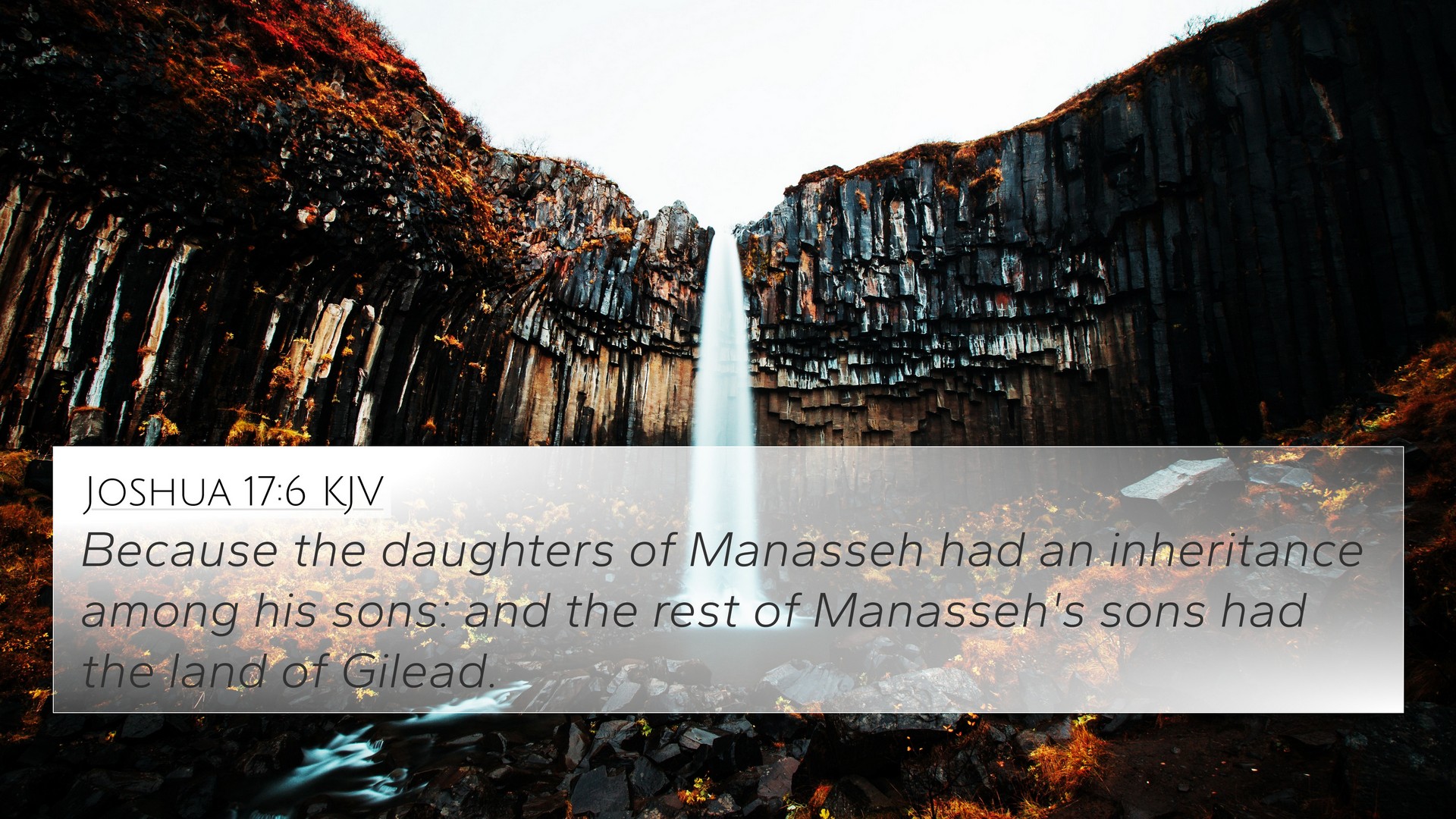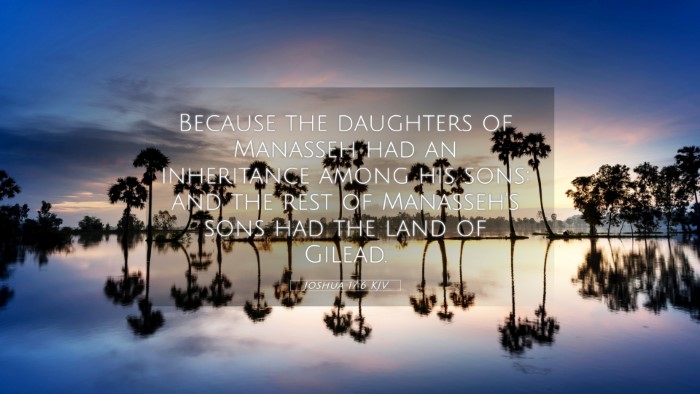Old Testament
Genesis Exodus Leviticus Numbers Deuteronomy Joshua Judges Ruth 1 Samuel 2 Samuel 1 Kings 2 Kings 1 Chronicles 2 Chronicles Ezra Nehemiah Esther Job Psalms Proverbs Ecclesiastes Song of Solomon Isaiah Jeremiah Lamentations Ezekiel Daniel Hosea Joel Amos Obadiah Jonah Micah Nahum Habakkuk Zephaniah Haggai Zechariah MalachiJoshua 17:6 Similar Verses
Joshua 17:6 Cross References
Because the daughters of Manasseh had an inheritance among his sons: and the rest of Manasseh's sons had the land of Gilead.
Uncover the Rich Themes and Topics of This Bible Verse
Listed below are the Bible themes associated with Joshua 17:6. We invite you to explore each theme to gain deeper insights into the Scriptures.
Joshua 17:6 Cross Reference Verses
No cross reference images were found in our system for this Bible passage.
Joshua 17:6 Verse Analysis and Similar Verses
Understanding Joshua 17:6
This commentary provides insights into Joshua 17:6, drawing from various public domain commentaries, including those by Matthew Henry, Albert Barnes, and Adam Clarke. This verse is pivotal in understanding the division of the land among the tribes of Israel, particularly with regard to the children of Joseph—Ephraim and Manasseh.
Verse Context
Joshua 17:6: "For the daughters of Manasseh received an inheritance among his sons; and the rest of Manasseh's sons had the land of Gilead." This verse highlights the unique case of the daughters of Zelophehad, who assert their rights to inheritance within the tribal lineage, indicative of the broader themes of justice and inheritance in Israel.
Verse Interpretation
Matthew Henry: Henry emphasizes the remarkable instance of gender inclusion in inheritance matters. The daughters of Zelophehad had the faith and boldness to claim their rights as heirs, a testament to their father's legacy. Their case exemplifies God's justice and provision, breaking societal norms regarding inheritance.
Albert Barnes: Barnes further elucidates that this inclusion of women in the inheritance process signifies a significant change in societal structure. According to the Law, God desired the equitable distribution of land, and this narrative reflects His commitment to fairness, even within a patriarchal society.
Adam Clarke: Clarke provides an analysis of how this scenario reflects God's power and promise. By granting inheritance rights to the daughters, God reaffirms His covenant with the tribes of Israel and demonstrates that His divine plan is inclusive, transcending traditional barriers.
Related Bible Verses
- Numbers 27:8-11 - Discusses the command regarding inheritance rights for daughters.
- Deuteronomy 21:15-17 - Explains laws on inheritance among sons and how favoritism is to be avoided.
- 1 Chronicles 2:34-35 - Acknowledges the inheritance of daughters within the tribes.
- Luke 8:3 - Highlights women in Jesus' ministry and their importance, reflecting a shift in cultural views on women’s roles.
- Galatians 3:28 - Indicates that in Christ, there is no distinction among genders, paralleling the inclusion seen in Joshua 17:6.
- Matthew 5:5 - Blessed are the meek, as this passage reflects the virtues exemplified by the daughters of Zelophehad.
- Hebrews 11:1 - Faith is the basis of the daughters' claim, paralleling their actions with faith exhibited by biblical figures.
Thematic Connections
This verse illustrates several themes relevant to biblical interpretation:
- Justice: The narrative emphasizes God's provision for the marginalized and His justice in societal structures.
- Inheritance Rights: It elaborates on the importance of inheritance, and how God's laws were designed to ensure fairness.
- Faith and Boldness: The daughters of Zelophehad exemplify faith and courage, serving as a model for believers.
- Transformation of Social Norms: The verse suggests a shift from traditional patriarchal norms to a more inclusive understanding of community and inheritance.
Cross-Referencing Biblical Texts
This passage serves as a bridge to understanding many aspects of biblical law and its implications for modern interpretations of gender roles. By examining cross-references, we can uncover deeper theological insights about God’s nature and His desire for equity.
Connecting Numbers 27 and Luke 8 shows not only God's plan for Israel but also His inclusive nature in Christ. The connections between these verses indicate a lasting theme of justice and inclusion within the narrative of salvation history.
Conclusion
Joshua 17:6 challenges readers to reconsider traditional interpretations of gender roles within scriptural contexts. By engaging through cross-referencing and thematic analysis, we are better equipped to understand the dynamic and inclusive nature of God's kingdom.
This exploration of Joshua 17:6 invites a deeper dive into the connections between Bible verses, showcasing the richness of inter-Biblical dialogue and how one verse can echo throughout Scripture, illuminating themes of justice, faith, and societal transformation.


